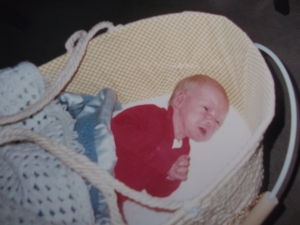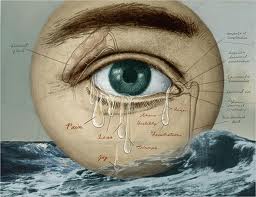 I have a memory of my mum exclaiming one day when Dylan was a baby: ” He’s crying real tears! Look – real tears!” I wasn’t sure why mum was so pleased; for me the tears were only a cause for concern. I busied myself adjusting blankets and fussing around, trying to stop the crying.
I have a memory of my mum exclaiming one day when Dylan was a baby: ” He’s crying real tears! Look – real tears!” I wasn’t sure why mum was so pleased; for me the tears were only a cause for concern. I busied myself adjusting blankets and fussing around, trying to stop the crying.
I wonder whether that memory has stayed with me because of the subsequent absence of tears? Dylan doesn’t cry tears now and I don’t have any memories of him crying tears as he was growing up. I don’t know when he stopped crying; for all I know the tears which my mum saw when Dylan was a baby are the only ones he ever cried.
*
http://ed.ted.com/lessons/why-do-we-cry-the-three-types-of-tears-alex-gendler
The link above is to a cute animation which explains the three different types of tears which we cry (basal, reflex and emotional). I’m puzzled as to why I never see Dylan shedding basal or reflex tears, which have a physiological purpose and which we don’t control, but for purposes of this post my particular interest is in emotional tears. Not that we are always in control of emotional tears:
I struggled to hold back the tears…
I felt myself welling up…
Then the flood gates burst…
I fought back the tears…
While there are things we can do to avoid it, some tears fall no matter how hard we try.
It’s OK let it out…
That’s right – have a good cry…
And once ambushed by tears they can be hard to stop:
Come on now, dry your eyes.
 The animated film makes some observations about the social context of emotional tears which may be relevant to autism. There is a tearing spectrum in the general population which ranges from people who cry easily through to those who claim that they never or rarely cry. Some people suggest that the propensity to cry is linked to variables such as age and gender: boys learn early in life that it isn’t ‘masculine’ to cry tears and so tend to suppress them in public. Gender and age are not plausible explanations for Dylan, however, who lives his life without reference to stereotypes about what is or is not appropriate behaviour (I’ve written about this here and here).
The animated film makes some observations about the social context of emotional tears which may be relevant to autism. There is a tearing spectrum in the general population which ranges from people who cry easily through to those who claim that they never or rarely cry. Some people suggest that the propensity to cry is linked to variables such as age and gender: boys learn early in life that it isn’t ‘masculine’ to cry tears and so tend to suppress them in public. Gender and age are not plausible explanations for Dylan, however, who lives his life without reference to stereotypes about what is or is not appropriate behaviour (I’ve written about this here and here).
My observation about Dylan not shedding tears relates not just to his ‘public face’ but also to his private life. One of the benefits of autism is that Dylan doesn’t have two faces: there is no pretence or deceit about who he is. So although Dylan doesn’t produce ‘real tears’, he isn’t capable of crying ‘crocodile tears’ either. Crocodile tears, according to the Oxford English Dictionary, are ‘tears or expressions of sorrow that are insincere’. The expression, apparently, comes from folk lore that crocodiles weep in order to lure their prey, or that they cry for the victims they are eating. A Wikipedia entry notes that: ‘while crocodiles can and do generate tears, they do not actually cry’. This distinction between the physical act of shedding tears and the behaviour we understand as ‘crying’ emphasises the role of emotion. Thus the Cambridge Online Dictionary defines crying as ‘to produce tears as the result of a strong emotion, such as unhappiness or pain’.
 Am I suggesting that Dylan doesn’t feel pain or unhappiness acutely enough to shed tears? Absolutely not. Dylan’s emotional life appears to me as intense as anyone’s I have known; although he sometimes seems confused by his feelings, he experiences them passionately. For some years I have been convinced that ’empathy’ – something that has been thought to be impaired or limited by autism – is a quality which Dylan has in abundance (I have written more about this here). I would go so far as to say Dylan sometimes over-empathises with others. Certainly he is capable of showing concern for those he believes are in distress.
Am I suggesting that Dylan doesn’t feel pain or unhappiness acutely enough to shed tears? Absolutely not. Dylan’s emotional life appears to me as intense as anyone’s I have known; although he sometimes seems confused by his feelings, he experiences them passionately. For some years I have been convinced that ’empathy’ – something that has been thought to be impaired or limited by autism – is a quality which Dylan has in abundance (I have written more about this here). I would go so far as to say Dylan sometimes over-empathises with others. Certainly he is capable of showing concern for those he believes are in distress.
There are parts of Dylan’s favourite films, for example, which he cannot bear to watch: a scene in ‘The Lion King’ when Simba is in the ravine during a wildebeest charge and a scene in ‘Pinocchio’ involving a whale are two cases in point. Dylan has watched these movies hundreds of times: he knows the inevitability of these scenes and that everything turns out alright but none of this matters to Dylan who feels distress and anxiety for the lions and the puppet boy no matter how many times he watches these films. Dylan’s sorrow and feeling for the characters he loves is tangible and real; at these times he runs from the screen and lays on his bed pummelling the mattress and vocalising, his face twisted in tearless agony.
 These feelings for somebody else – which seems to me to be a mix of empathy (being able to identify with the character’s suffering) and sympathy (caring about the character’s suffering) – have also been demonstrated by Dylan in relation to real people. On various occasions over the years Dylan’s teachers have reported his concern and care for fellow pupils in his class who have become upset, and Dylan’s obvious distress at their unhappiness.
These feelings for somebody else – which seems to me to be a mix of empathy (being able to identify with the character’s suffering) and sympathy (caring about the character’s suffering) – have also been demonstrated by Dylan in relation to real people. On various occasions over the years Dylan’s teachers have reported his concern and care for fellow pupils in his class who have become upset, and Dylan’s obvious distress at their unhappiness.
One of Dylan’s particular anxieties has always been crying babies; the sound triggers in Dylan such levels of distress he is prone to sudden flight reaction. As Dylan tries to escape the crying baby, he clamps one of his arms tightly over his head in an attempt to block the sound of crying. ‘Baby crying, baby crying’ he shouts in distress. Recently it occurred to me that if you didn’t know anything about baby behaviour then the sound of one crying might be fairly alarming. Why should Dylan take the sound of a baby crying in his stride, as if it didn’t matter? Perhaps Dylan’s extreme reaction to crying is triggered by his concern that the baby is distressed. So I have started saying to him: ‘The baby is crying because it wants a drink’ or ‘The baby is OK. Don’t worry. It isn’t hurting.’ This seems to help a little.
Could Dylan have been getting upset all these years because he thinks crying babies are hurting babies? If so, that might suggest that Dylan feels both empathy and concern. My sense is that Dylan understands crying is something we do when we are distressed and that he cares about the distress of others. I’m not sure, though, why he doesn’t cry tears himself. Perhaps crying tears requires an emotional self-awareness which Dylan currently lacks (this possibility is discussed in one of the links below). Or perhaps he simply doesn’t like the sensation of salty liquid on his skin.
Useful Links:
This link is to a post on autism and crying by a blogger who is herself autistic:
http://www.mindretrofit.com/2013/10/19/
The blog includes some links to related readings which raise some interesting questions for me in relation to Dylan. One article suggests that emotional tearing is linked to Nerve Growth Factor (NGF), for example, and another stresses the role of the endocrine system in emotional tearing. Research in this area is apparently very limited but I can imagine might be relevant to those with an interest in the biochemistry of autism. A further issue raised is the ‘developmental shift from vocal crying to visual tearing’ which could also be relevant given ‘developmental delay’ in autistic children.
Acknowledgement:
Sources of images (other than Dylan) unknown but appreciated.



Pingback: That Fishy Feeling: autism and empathy | Living with Autism
Pingback: Teaching My Autistic Son To Laugh: a woman’s gift | Living with Autism
Thank you, my daughter expresses anxiety when someone else looks sad or if she hears a crying baby. She cried tears as a baby upon my leaving, and has cried just a few times since growing up. I haven’t seen tears for years though.
LikeLike
Hello T – thanks for reading and your comment. It is so interesting to me that your daughter is similar to Dylan in this respect. I have gone on looking for tears in his eyes but still haven’t seen any. Judging by the number of people who find this post by searching for ‘my autistic child doesn’t cry’, I suspect this is pretty common across the spectrum. I still don’t know why!
LikeLike
Pingback: Learning Through Dialogue: reflections on blogging (ii) | Living with Autism
This is interesting. In our household experience of mixed levels of AS spectrum we range from my daughter who, since coming out as transgender, has cried very regularly, to my partner who does not engage with emotions so tears (except in frustration or anger which is blocked energy) are unlikely. Those who engage more with their mental levels or intellect also engage with empathy in this way practically- why is the baby in distress, why is no-one assisting? I would be drawn to want to help the baby or translate his needs for the parent. I have learnt enough social skills to interpret when I can insert any information without making the parents feel inadequate- empathy goes both ways. Poor babies have a hard time making their needs understood. They may be in pain from colic or overstimulation of the senses. How can they put that over to an adult who does not feel this? We see the same with pets. we, like many sensitives, end up called ‘whisperers’ merely because we do not buy into emotions but ask the animal to picture to us its needs. Crying when an animal or baby is in distress doesn’t help them and they wonder at our (lack of) action. So maybe what i am saying is: why do so many want to see their child cry, when the child could be helping? When we look at a world disabled by inaction or making shockingly illogical decisions based on emotional responses, would it not be better to have many more in it who can stand back and act in responsibility and wisdom?
LikeLiked by 1 person
Hi Rosie – thanks for your reflections. Very interesting. I wrote the post about tears some while ago now. Dylan still gets upset by crying babies and he still doesn’t cry real tears. As you say, babies have a hard time making themselves understood and maybe Dylan is picking up on the edge of frustration and anxiety in their crying, which in turn distresses him. Since I made that post I have been amazed at the number of people who have found their way to it by googling something along the lines of ‘why my autistic child doesn’t cry’ or similar – so as far as that is an indication of anything, it perhaps suggests that the link I observed in my own son is also observed by other parents…
LikeLike
I just took my son (18 yrs old) to see the new Dinosaur movie with a typically developing child. She cried during the movie, as did her mother and me. My son did not. He held his ears a bit. My friend asked him if he cried and he said no. It dawned on me that I haven’t seen him cry since he was a baby. Fascinating. He does exhibit empathy and sympathy, but tears just don’t flow. More research on this would be interesting.
LikeLiked by 1 person
That’s really interesting. I so agree with you that research in this area would be interesting – I know so many parents now who report the same thing. I think it is a lack of tears, not a lack of empathy, but interesting nonetheless. Dylan and I just saw that movie too 🙂
LikeLike
My son with autism who passed away 2 years ago never shed a single tear when he cried. I wondered for years if there were others like him. He also suffered from dyspraxia that affected nearly every aspect of his life.
LikeLike
Thank you for reading and for your comment, Barbara. I’m so sorry to hear your son passed away. It’s interesting to read that you also observed the lack of tears. It’s a while since I wrote that post and I still haven’t seen my son shed tears.
LikeLike
Pingback: Death and The Queen: explaining to Dylan | Living with Autism
Thank you so much for your article. My autistic daughter has taken quite some time to “find her tears.” She is now nine and will produce the occasional single tear when experiencing strong emotions. As a young child if she fell and say scraped her knee she would physically manifest all the reactions you might expect except for the tears! I was so baffled by it I actually had her examined by an ophthalmologist when she was a preschooler only to be told all is physically ok, and that she must be a “chill” kiddo. (I knew that wasn’t exactly true) She was identified as autistic just last year and I cannot help but think there must be a link! Like your son she is incredibly attune to other’s suffering and she is mesmerized when say I cry at a sad part of a movie. She will stop watching the movie only to watch me. I wish there were more research or interest taken into this as it seems this may not be uncommon!
LikeLike
Hello Jen, thanks for reading. It is so interesting to hear that you noticed this about your daughter before she was diagnosed. I have had lots of people confirm that they have also noticed this about their autistic child retrospectively, but you are the first person to mention that you noticed it before and thought the lack of tears was odd. I also think you’re right that this could be explored further – of all the posts I’ve written for this blog over many years now, this one gets the most traffic and it is continuous. I suspect this is from people googling about lack of tears because they are puzzled – I am convinced it is very common! All the very best to you and your daughter at the start of your journey, x
LikeLike